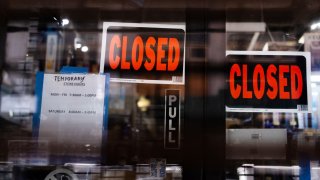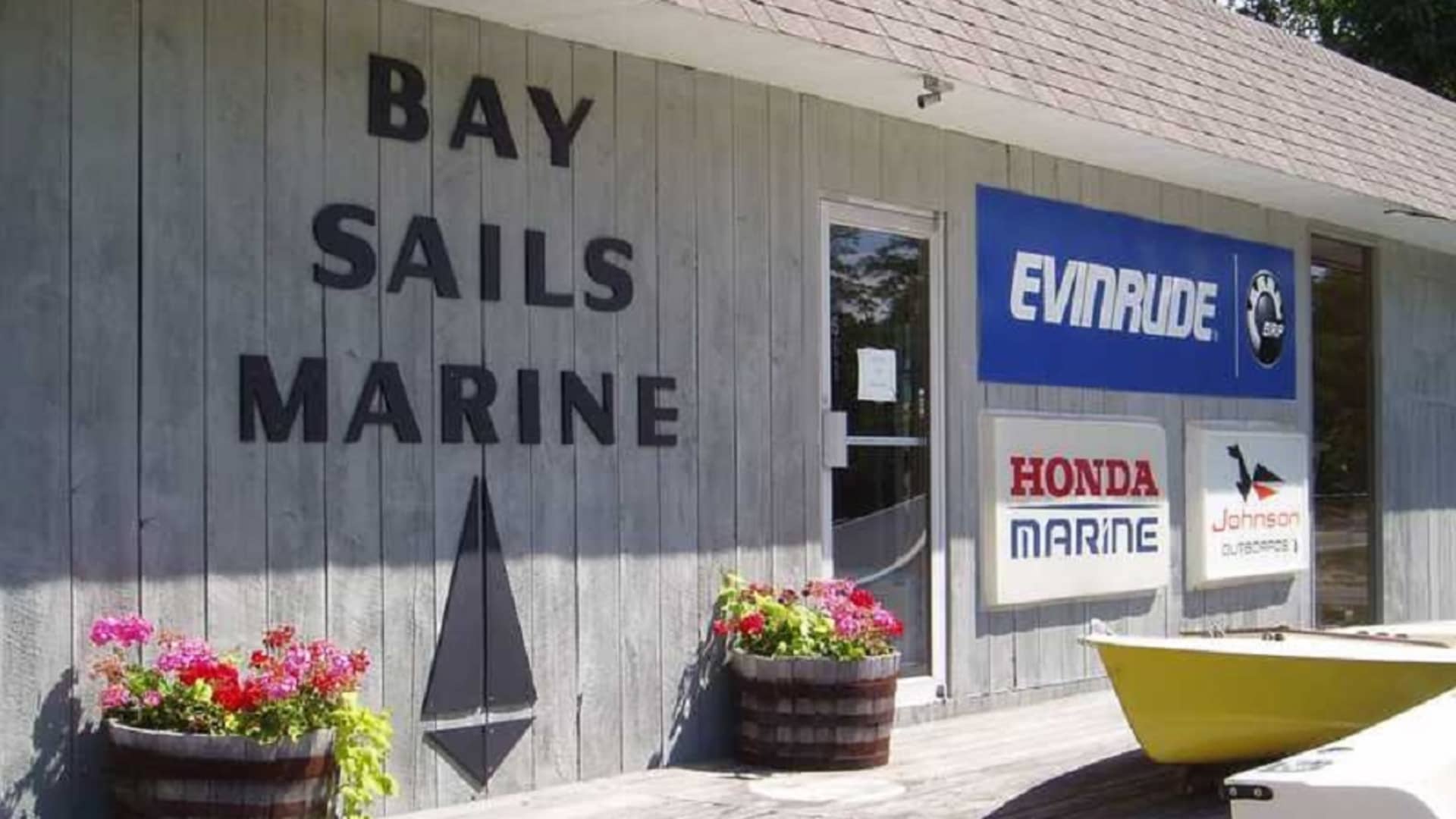
The government's nearly $350 billion loan program for small businesses officially ran out of funds on April 16, even as many American business owners are still struggling to make ends meet or plan for an uncertain future amid the coronavirus pandemic.
Congress and the Trump Administration continue to negotiate on adding another $250 billion to the first-come, first-served program, which has seen over 1.6 million applications even as criticisms have mounted over delays and confusion in the application process.
Holly Wade, the director of research and policy analysis for the National Federation of Independent Business (NFIB), the country's largest small business association, tells CNBC Make It she's heard from countless small business owners with concerns about the application and payout process for the Small Business Administration's [SBA] $349 billion Paycheck Protection Program [PPP].
"The list of frustrations is long," Wade says, noting that many businesses had trouble finding bank lenders to accept their applications, especially if their personal bank wasn't participating in the SBA's program, after the application process kicked off at the beginning of April.
In fact, many small businesses across the U.S. that have already been approved for loans are still waiting for money to actually hit their bank accounts, while others are worried that strict guidelines over how they can disburse that money could ultimately do more harm than good to their business.
Wade sums up one of the most prominent complaints she is hearing from small business owners, who tell her: "'I've applied and I have no idea when I can expect the loan to be deposited, and so I don't know how to accurately adjust my business operations based on declining sales and keeping the door open,'" she says.
One small business owner who is still waiting for his loan money to come through is Lyle Butts, the 73-year-old owner of Bay Sails Marine, a boatyard and marine supply store located on Cape Cod in Wellfleet, Massachusetts. Butts has been running his business for five decades, so he says he's survived numerous financial crises in the past.
Money Report
"This is, kind of, not my first rodeo," Butts tells CNBC Make It. "But, certainly never anything like this before."
Butts started the application process for the SBA's PPP loan over the first weekend of April and he estimates the process likely took roughly 20 hours of work from himself, his retired wife and one of his business's eight employees.
What's more, he had to enlist the help of his longtime accountant (a factor that will likely end up costing him up to $500 in fees on its own, he estimates) to go over the company's financial records and ensure everything would be in order for Butts' loan request of roughly $50,000, he tells CNBC Make It.

Butts finally submitted the application to his bank on Tuesday, April 7, nearly four days after he'd started the process. He claims his bank approved the request but, as of Friday morning, the funds had still not been deposited in Butts' account and he had yet to hear any word from his lender or the SBA on when he could expect to see the money that he says he'll need to keep his employees paid and his business afloat for "another couple of months."
Butts is adamant that he's not looking to lay off any of his employees. Because Bay Sails Marine is a part of the transportation industry — it offers boating storage and supplies — the company has been deemed an essential business, which means Butts can still keep operations running, but business has still dropped off. The company, which typically brings in between roughly $1 million and $1.5 million in annual revenue, has seen its business drop off by about 50% amid the coronavirus pandemic, Butts says.
For that reason, Butts is relying on the loan coming in sooner rather than later.
"We put some money aside and we're good for awhile yet, you know, we can keep the corporation running for another month," says Butts, adding that after a month, without loan money coming through, he would have to start dipping into his retirement fund to keep paying his employees. "And, I just can't do that."
"You know, I'm at the age where I don't have a second shot here," he says of the possibility of replenishing his retirement fund should he need to use it as a financial resource.
U.S. Treasury Secretary Steven Mnuchin and SBA Administrator Jovita Carranza issued a joint statement on Wednesday urging Congress to "appropriate additional funds" for the PPP loan program, as the SBA is now no longer accepting new applications with funding running out.
And despite some criticism, when reached for comment by CNBC Make It, an SBA spokesperson touted the fact that the SBA "processed more than 14 years' worth of loans in less than 14 days," in a nod to the massive size of the undertaking that has been the PPP program.
"The Paycheck Protection Program is saving millions of jobs and helping America's small businesses make it through this challenging time," read the joint statement from Mnuchin and Carranza.
However, even as small business owners like Butts play the waiting game with their approved loans, others who have access to their borrowed funds are now concerned that the guidelines around their disbursement might not actually be in the best interest of their business.
For instance, Agatha Kulaga, co-founder and CEO of the small New York-based bakery chain Ovenly, made the difficult decision to temporarily lay off all of her company's 67 employees, herself included, after shutting down operations at Ovenly's four retail locations and one commissary kitchen on March 16.
The idea was that, while Ovenly's doors were closed for business and no income coming in, Kulaga could obtain a loan to cover working capital costs (rent for Ovenly's locations, utilities, etc.). She could also set some of that money aside for costs that will arise once it's time to eventually reopen the bakery's locations, at which point Kulaga says she "absolutely" plans on re-hiring all of her former employees.
Meanwhile, Ovenly's laid off employees could continue to collect unemployment benefits while the company's doors remain shut to customers.
However, while Kulaga has been approved for her requested $410,000 loan and received those funds this week from her lending company, Newtek, she's now unsure of how, or if, she should even go forward with using that money.
When the loan application process kicked off at the beginning of April, Kulaga says she and other small business owners' actions were motivated by the fact that the loans were first-come, first-served. "We were scrambling to apply for these loans," Kulaga tells CNBC Make It. "And the advice that everyone was getting was, 'Don't worry about the details, apply for the loan. It will help your business survive.'"
However, she adds, "the brand new challenge is that I don't know if I should even accept this money or if I should return it because … the guidelines and the regulations for how to use this money do not make sense for businesses that are closed."
Kulaga is referring to the fact that the government has stipulated that, for eight weeks after receiving the PPP loan, at least 75% of that money go toward paying employees based on companies' existing payroll before the coronavirus shutdowns began. If Kulaga and other businesses taking out PPP loans do not meet that payroll threshold, then their loans will not be forgiven by the government and they'll have to repay the loans at 1% interest within two years.
In other words, for business owners like Kulaga, who made the painful decision to shut down operations and lay off her employees when it became clear that her company could no longer operate amid coronavirus restrictions, the only option when accepting a PPP loan is to either commit to paying that money back to the government with interest or quickly rehire all of her employees in order to pay them at their normal rates for work that they cannot currently perform.
"Some people are suggesting, 'Well, just pay people to stay at home,'" Kulaga says. "But that does not help my business survive. The whole point of the money for small businesses, when we were applying, was to get this money to be able to reopen and to be able to cover our costs for the time that we were not making any sales."
Meanwhile, Kulaga adds, Ovenly would not be able to make enough money to survive even if she did rehire all of her employees and restart minimal operations. Delivery service is typically only "a small portion of revenue" for her business, Kulaga says, and even that relies on making baked goods for large catering orders — a business that has certainly dried up with government orders restricting large gatherings of people.
She also fears the possibility that she would rehire her employees with the government loan money only to have the coronavirus pandemic continue to keep businesses at least partially shut well into the foreseeable future, making it impossible for her to fully reopen Ovenly's locations. In that scenario, she might not have enough money left over to cover rent and other expenses, and she could just find herself stuck in the same position a few months down the road.
"If we do not reopen, I will have to re-lay them off and they will have to refile for unemployment," she says of her employees. "Who would want to do that?"
The NFIB's Wade tells CNBC Make It that Kulaga is far from the only business owner experiencing frustration over the strict guidelines they have to follow in order to ensure their PPP loan will ultimately be forgiven, which would essentially make it a much more desirable government grant rather than a loan with interest.
In many cases, businesses already laid off employees when non-essential businesses were shuttered by lawmakers. But others are depleting their savings and resources by continuing to pay their employees while awaiting a government loan that they know will require them to use 75% of the money on pre-existing payroll in order to eventually be forgiven.
"We're hearing from more small business owners who are really frustrated with that part of it, in that they don't know when to expect the loan, they've been trying their best to keep their employees on the payroll … So, they thought, 'Well, I'll likely get this loan soon, so I'll just use savings and reserves to bridge that and keep them on payroll.'"
"And, now, just day after day goes by without hearing when they might receive the loan. And, they don't know how long they can keep that up."
Wade notes that many small businesses have also been applying for money through the SBA's Economic Injury Disaster Loan program [EIDL], which provides disaster assistance loans of up to $2 million. However, hardly any of that money is eligible to be forgiven. And while more than 4 million businesses have already applied for more than $380 billion in EIDL funds, as of Wednesday Congress had allocated only about $17 billion of that money to businesses, CNBC previously reported.
"We haven't heard anyone that's received the loan," Wade says of the EIDL program.
For now, Ovenly's Kulaga is left to decide if she should just go ahead and use the money that's available to her now to rehire her staff even if there's a possibility of a large repayment in two years if she doesn't meet the PPP guidelines -- along with the potential scenario where she would have to lay off her staff all over again if business can't return to normal soon enough.
"In two years, I would have to figure out a way to pay back $410,000," she says. "And for many businesses, they would go out of business if that was the case."
Her lawyers and accountants are advising Kulaga to take the money now and hope that the guidelines might eventually change (though, the NFIB's Wade says she hasn't heard anything to make her think such changes could be happening soon).
"That doesn't leave business owners in a great place," Kulaga says.
Check out: The best credit cards of 2021 could earn you over $1,000 in 5 years
Don't miss:
If you lose your job due to the coronavirus pandemic, here's how to navigate filing for unemployment
Like this story? Subscribe to CNBC Make It on YouTube!






